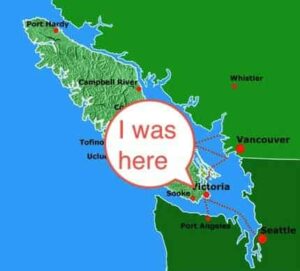I spent this past week speaking in British Columbia, but first some general observations on Canadian culture.
- I’m not used to courteous driving, and I aged 2 years watching my drivers slow down in anticipation of green lights possibly turning yellow, letting other drivers weave in, or just generally not being violently aggressive. They’d never make it on the east coast. I don’t even want to think what would happen to them in Asia.
- But how about that maple syrup !!
- I want the US government to give me $1 and $2 coins, too.
- I boarded the airport shuttle at 4:05 am. At 4:10 a family of three got on and gave me about the cheeriest, most melodic, “good morning” I’ve heard since I saw Aunt Bea put a plate of waffles in front of Opie and Andy. Overall, these people are just plain nice, and it almost rubbed off on me.
Anyhoo, I spent the first two days in Victoria, which is on an island, even further away from the US than normal Canada. I spoke first at the University of Victoria on “Academic Freedom and Religious Faith.” I’ve given this same general talk a few times now, and heads nod so often I’m almost afraid they’re going to fall off. I recount my own professional experiences from a historical and sociological perspective, trying to explain the dynamic behind why guarding tradition is held at such a high premium in some Christian circles, which often leads to a lot of heat. (Short answer: fear of losing group identity and the life-narrative such identity provides.)
My host in Victoria was Dr. Rob Fitterer, lead pastor of The Place Community at Lambrick Park Baptist Church, where people gather weekly to hear talks and discus challenging topics. I spoke Tuesday evening there on my book The Evolution of Adam. The place was packed, the crowd hugely supportive, and the discussion could have gone on all night.
I speak often in church settings like this one, where honest discussions about controversial topics are seen as a means of growth, not something to be kept at arm’s length to protect the susceptible masses, as I sometimes hear.
 The next day, I took the ferry to Vancouver and then drove on to Langley, where I spoke that evening at Trinity Western University on “Reflections on the Bible, Evolution, and the Journey of Faith.”
The next day, I took the ferry to Vancouver and then drove on to Langley, where I spoke that evening at Trinity Western University on “Reflections on the Bible, Evolution, and the Journey of Faith.”
Great energy among the students and faculty. I walked through my own approach to interpreting the Bible, the task of theology, and the genuine mystery involved in speaking on topics like God, the human drama, and our life of faith.
The Q&A that evening, along with an open lunch with students the next day, topped off with a faculty only discussion afterwards, were great. Clearly not only science and faith but a whole host of others issues are very much on the minds of students and faculty alike, and their questions reflect my own and those of other Christian colleges I have visited.
As I see it, it comes down to this: what does it mean for followers of Christ to engage the world we live in with intellectual integrity, and what exactly is the task of a Christian college/university in preparing students to do that, given that such institutions are walking a (financial) tightrope of serving both a heritage and an ever-changing world? My advice was, “Don’t ask me. I tried doing that once and it didn’t work out too well.”
Many thanks to my great hosts, drivers, and dinner partners at TWU: Jens Zimmermann, Tony Cummins, Craig Broyles, and Dennis Venema.
